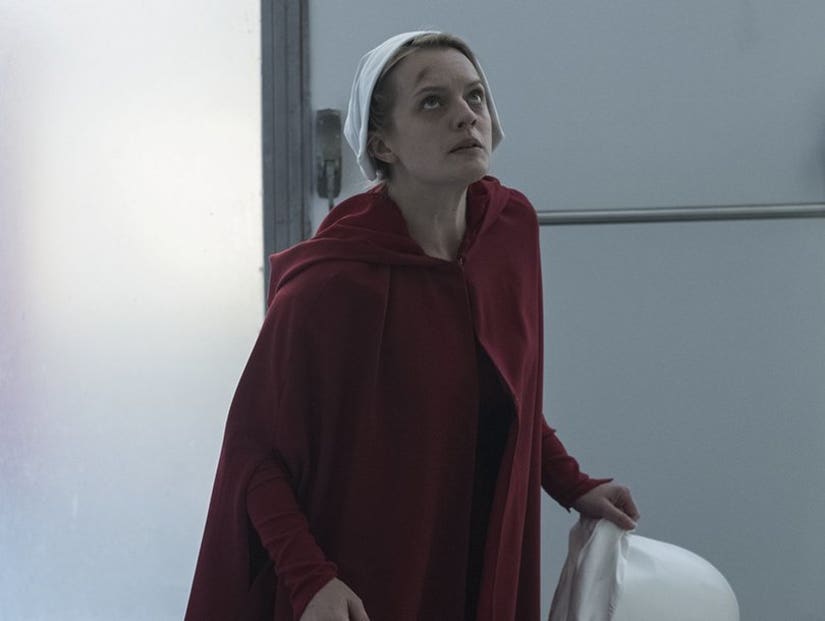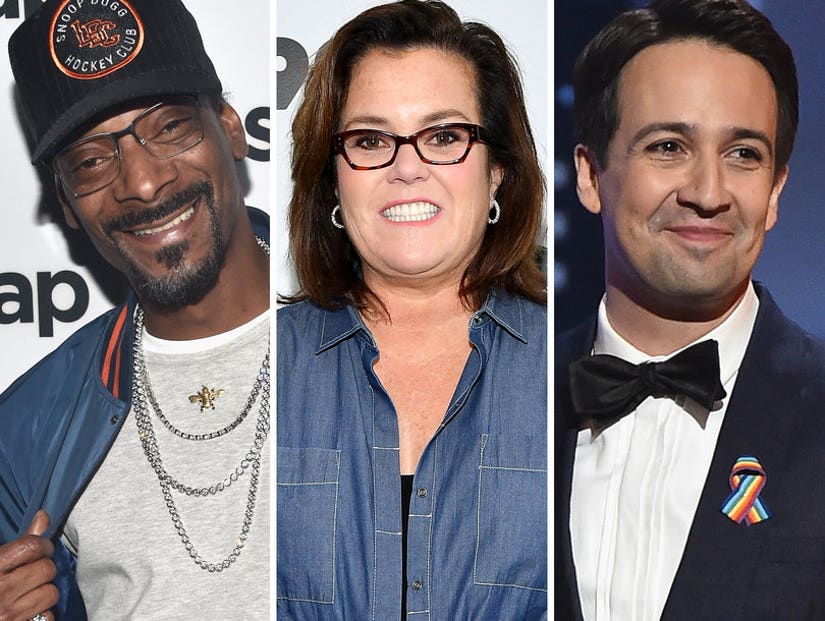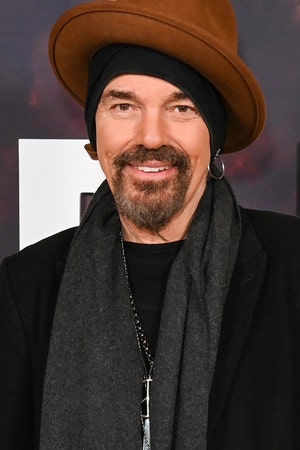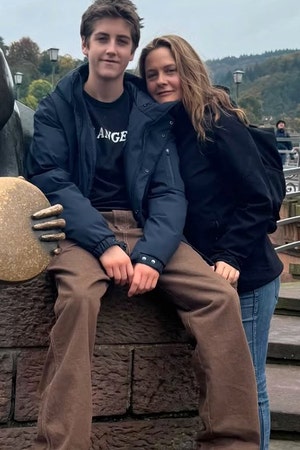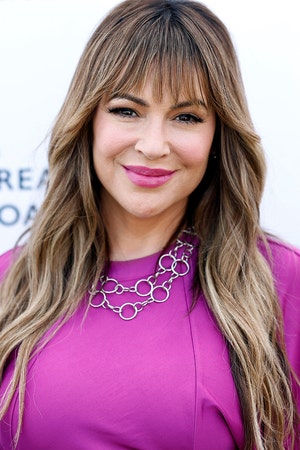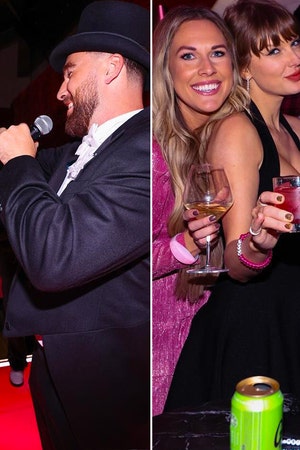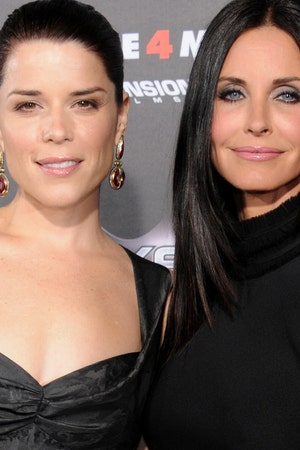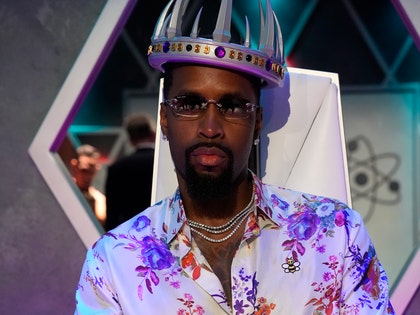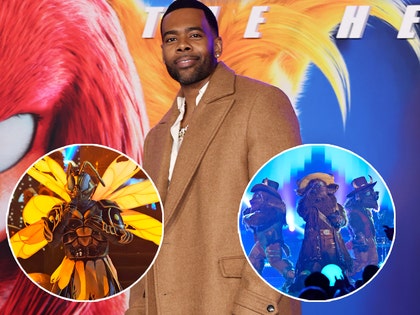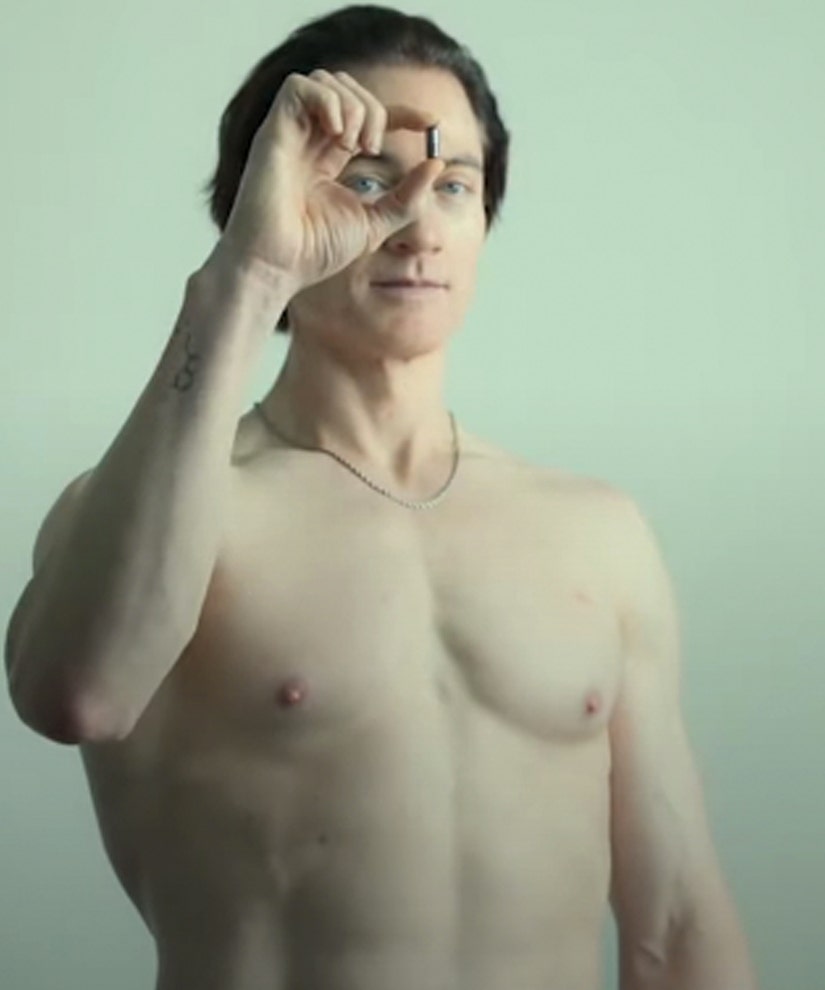"The Handmaid's Tale" returned to Hulu Wednesday, and it's clear the creators have officially moved beyond Margaret Atwood's 1985 novel, so they find themselves looking elsewhere for inspiration. It appears they have settled on us.
In the world of "The Handmaid's Tale," it is growing infertility that led to people slowly giving up their personal rights while accepting abhorrent and inhuman behavior in their fellow citizens. But the show is painting a pretty clear allegory of modern America, where it is economic disparity and struggle that is opening these same doors. In "The Handmaid's Tale," it was Gilead that walked through the door, usurping power and setting up their hypocritical theocracy. The question we are to ask is what we are opening ourselves up to.
 Getty
Getty
Leah Remini Calls Out Elisabeth Moss for Supporting 'Abusive' Scientology
View StorySeason 2 of "The Handmaid's Tale" offers us a wider view of this new world, and it is even bleaker than Season 1. Just as we were left with a glimmer of light as the Handmaids refused Aunt Lydia's (Ann Dowd) demands that they stone one of their own to death, the new season picked up by immediately dashing everyone's hopes that such defiance would do anything but cause more suffering. The time for defiance was before they handed their world over to this new faction.
Already in the first season, we have seen June (Elisabeth Moss) stripped of her family, her freedom and even her name. Now, she is Offred (Of Fred), a handmaid who serves but one purpose, to get pregnant by her Commander (Joseph Fiennes) and hand her baby off to his wife (Yvonne Strahvski). Yes, she's to be stripped of that, too, before being sent to another Commander to repeat the cycle. Sure, it seems pretty far-fetched, but flashback sequences show that June was living a life quite familiar to most of us not that long ago.
INCREMENTAL REGRESS
In most post-apocalyptic scenarios, normal society collapses in an instant as a result of some cataclysmic disaster. Not so "The Handmaid's Tale," where society's collapse happened bit by bit and piece by piece, with average American citizens standing on the sidelines and watching it happen, never quite believing how far it could go. Even more harrowing than the nightmarish world "The Handmaid's" America has become are those glimpses into the near past to see how it got there. It is here that the creators are most blatantly telling us to open our eyes to the warning signs all around us.
It starts with little transgressions of our personal freedoms, like the moment June was challenged by a nurse at the hospital over whether or not she was a fit parent because the school couldn't reach her when her daughter was running a slight fever. What seems like a simple overreaction had a harrowing sense of foreboding because we know what comes next. It was a sign of a systemic change in the reach of the federal government over people's lives. On the show, that overreach is about protecting the world's most precious resource: children. In the wake of 9/11 in our world it was about security and fighting terrorism. It's always about something.
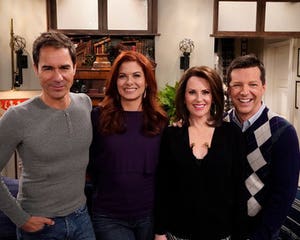 NBC
NBC
5 Ways 'Will & Grace' Fell Short in Trump's America and 4 Ways They Got It Just Right
View StoryPATRIARCHAL CONTROL
In one pre-Gilead scene in this premiere, we learn that June's husband Luke (O.T. Fagbenle) must sign her birth control prescription to verify that he approves of her being on them. A man with control over what a woman does with her body? Sound familiar? That was a little thing both June and Luke ignored, seeing it as more of an annoyance to their daily lives than a harbinger of the hell to come. We saw several similar indignities in Season 1, but in every case the couple just shrugged their shoulders like it was all out of their power and adapted.
That is the cautionary part of the tale, because as we endure full-body scans at the airport, watch LBGTQ rights being rolled back and no-fly lists implemented based on nationality, we are urged to ask, "What's next? What indignity will we accept next? And how far will we let it go?"
GENDER TRAITORS
One thing "The Handmaid's Tale" doesn't have to deal with is racism, which on the surface might look like a kind of twisted progress from where we are today. Not so. It's important to look at the root cause of the revolutionary movement that brought Gilead into being: growing infertility. In this world, one cannot afford to hate another race because every child is precious and every fertile womb is a commodity to be used and abused. A gift from God, as Aunt Lydia would say. It's not hard to see the short steps from this mentality to institutionalized rape and the dehumanization of fertile women, regardless of orientation, treated more like cattle than people.
Oh yes, hate lives on, only it's been redirected with intensified fury toward gay people, or "gender traitors" as the show calls them. After all, this entire society has been built around the importance of procreation, and gay people are actively skirting that biological process by dating within their own gender. Emily (Alexis Bledel) was a Handmaid that June met in Season 1, where we found out she was gay. Now she's being raped monthly by a man, because orientation is irrelevant when babymaking is the order of the day!
The second hour of this premiere offers our first glimpse at Emily's pre-Giliad life, and it shows us how easy it is to let hate lead to horrific crimes against humanity. It starts small, with people trying to hide their orientation, but it can quickly escalate into public hate crimes and legalized discrimination.
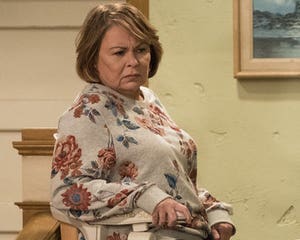 Getty
Getty
'Roseanne' Co-Showrunner Says Ignore Roseanne Barr's Hitler Photos and Politics
View StoryCOLLABORATORS
We follow along as Emily is stripped of her classes by her department head for fear that her homosexuality will raise red flags, never mind his own. He tries to pass it off as a good thing, telling her she'll have more time in the lab. This is turning a blind eye to injustice, and it's a slippery slope. Even worse, it's not only enabling unacceptable behavior and policy against a fellow human being's civil rights, it's acknowledging and accepting that those rights are no longer valid.
He'd stripped his office of any evidence of his partner and been called a collaborator by that same partner for it. It's a term that hearkens back to Nazi Germany, when Jews would work with the Nazis against their own people for hopes of special favor that never came. By spotlighting gay people in particular, though, "The Handmaid's Tale" is forcing us to acknowledge our deep national problem with homosexuality.
OPEN HATE
As we've seen with the rise of Donald Trump, those who spew hatred towards other disenfranchised groups like minorities, women and the gay community, have become emboldened. They're not hiding behind KKK hoods anymore, but spewing their hatred openly and publicly, as Donald Trump confidently insults and disparages people through his Twitter feed.
Take that confidence that people have to hate so openly and publicly, and it's not too hard to imagine the scene where Emily saw her department head hung from the school with the word "FAGGOT" painted beneath him on the ground. It was intentionally reminiscent of lynchings, which is what happens when racists feel emboldened. And so we are warned. The people who hate and discriminate are feeling emboldened and powerful. There is no greater warning sing that something needs to be changed than when the wrong people are feeling powerful. That means they've got a sense that the powers that be are on their side.
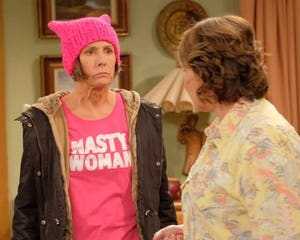 ABC
ABC
15 Ways 'Roseanne' Skewered Donald Trump, Hillary Clinton, Healthcare, Gender Identity and Itself
View StoryROLLING BACK RIGHTS
Already, we've seen Donald Trump trying to roll back the military rights of the LGBTQ community by banning transgender individuals from serving. His travel ban that discriminated against people (including American citizens) based on country of origin caused instantaneous havoc in airports nationwide. The laws can be changed that quickly, even if Trump is finding it difficult to keep his visions on the books.
In a single day on "The Handmaid's Tale," Emily and her wife (Clea Duvall) discovered that their marriage certificate had been rendered invalid. "It is forbidden," they were told coldly by an ICE agent at the airport, and when Emily tried to stand up for her rights, the agents only got more aggressive and forceful. Just like that, it was a government agency dispassionately ripping apart a family at the border (they were headed to Canada) as Emily had to watch her wife and child leave without her, much like we've seen with Dreamers being abruptly deported back to countries they've never known. Can it happen? It is happening.
BLIND COMPLIANCE
And yet, while Emily and her wife were being detained and harassed and ultimately stripped of their marital rights, it was Emily's wife who kept urging her to not be difficult, not raise a fuss, just go along with it. It'll be fine. She couldn't fathom that her government would turn on them so dispassionately like this; just turn its back on them so completely.
And yet it did, and that was just the beginning. After watching her wife and child leave without her, Emily was forced into being a Handmaid, and then when she proved too defiant last season, she was sent to The Colonies where she lives a miserable life digging up rocks and who knows what else while the women around her get sick and die. Her country betrayed her and she and her wife sat there and let it happen because they couldn't believe it would happen, just as the Germans did during Hitler's rise, and just as Americans are doing now ... because it can't happen here, right?

